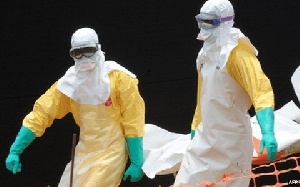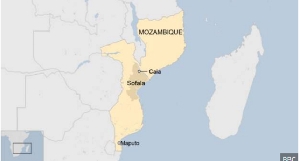Health News of Sunday, 27 July 2014
Source: Daily Guide
Comment: Ebola next-door
The death of Patrick Sawyer, a Liberian aged 40, in Nigeria’s megacity of Lagos should send shock waves to Ghana. he is suspected to have manifested symptoms consistent with Ebola before his death. Suspicion accentuated by the fact that he arrived in the city from Monrovia, Liberia.
If eventually confirmed, our authorities would have been more than adequately informed about the need to move faster than we have so far against this deadly disease which for now is the most fatal in the world.
It would be foolhardy to think that we are miles apart from areas which have already been, as it were, hit by the killer.
Nigeria and Ghana, although separated by Togo and Benin Republic, are sister countries: there is a heavy human movement between the two. When there is a trace of the deadly disease there is cause for worry.
We recall the recent ECOWAS deliberation on the subject by heads of state but shudder to think that like other issues discussed at that level the talking outweighs the action.
Health issues, unlike others, demand seriousness on the part of policymakers; anything short of this can be catastrophic. It is for this reason that we demand verifiable action plans towards obviating possible outbreak of the deadly disease.
Contingency arrangements of this nature should be devoid of red-tape and politics; otherwise we would fail to achieve the life-saving objective.
We have confidence in our health delivery personnel; however the political heads who more often than not rather than facilitate arrangements to manage programmes put up attitudes which are counterproductive.
One of the first steps to be taken against the deadly virus in our opinion is sensitisation of the populace, especially those in the borders areas, about Ebola.
Such education should include how to identify the disease and what to do in the event of coming into contact with persons manifesting suspicious symptoms.
We can learn from the Liberian situation. Families of infected persons are refusing to have victims go to the hospital, preferring to keep them at home. The authorities have responded by criminalizing those who keep infected persons at home as a means of compelling families to send victims to health facilities.
The relevant state agencies should be taken through drills that would prime them as to what to do in the event of Ebola making landfall here.
The Ghana Immigration Service (GIS), port health officials and even Customs, Excise and Preventive
Service (CEPS) who are the first set of agencies visitors meet should be educated about the disease and be part of the drill suggested above.
Perhaps we should start thinking of screening visitors who originate from Ebola-endemic areas.
Persons exhibiting suspicious symptoms should be immediately quarantined for further analysis.
Our disease research centres especially Noguchi Memorial Medical Research Centre should not suffer any financial challenge and should be especially tasked to take up the issue of Ebola considering our proximity to areas suffering the outbreak. No amount would be too much towards that direction.
These among other measures should not only be put in place but enforced at the relevant levels because Ebola is next-door.











